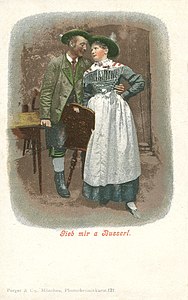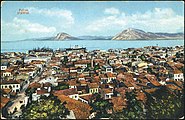Purger & Co.


Purger & Co. was a German printing house, based at Mozartstraße 13, Munich, Germany.[1] The founder of the company was most probably named Adolf Purger.[2] The company was known for the coloured postcards it produced mainly in the beginning of the 20th century. The early postcards of the company were printed in the last year of the 19th century.[3] The postcards were printed in three colour chromolithography, a system called photochrome,[4] with the indication Photochromiekarte.[5][6] The company was printing not only postcards for their own account, but also for other companies, as was the case, for example, of the colour postcards of the Krikelli's series of Tinos, Greece.[7]
Purger & Co. was active at least during the period 1899-1920 and produced postcards from all around Europe and the Mediterranean basin in photo-chromolithography.[8][9]
The postcards of Purger & Co. were numbered initially at the bottom of the postcard's face, but later (possibly after 1905) on the reverse side.[10]
Based in Munich, Purger & Co initially printed postcards with themes from the nearby regions of Bavaria, Austria and Northern Italy. Their first 1.000 numbered postcards depict images of these areas. They, afterwards, published postcards of cities in the Adriatic Sea, where the Austrian Lloyd operated several ship-lines carrying people and goods. Postcards of Morocco and Spain followed suit, as tourism started growing in these areas.
A review in 1907 mentions Purger & Co. as a specialized company for the production of cards of excellent quality and great variety and makes special note about their colours which are reproduced through such perfected process that the graduation of colour merit appreciative recognition.[11]
Purger & Co. is mentioned as one of the influential publishers of postcards of the golden era of postcards 1901–1905, amongst the names of Raphael Tuck & Sons of London, Hauser y Menet, and Casa Laurent (both significant Spanish publishers),[9] Künzlies (Künzli Brothers & Co. / Edition Max Künzli) of Zürich, Römmler & Jonas and Stengel & Co of Dresden, Paul Trabert of Leipzig, Brunner & Co of Como,[12] Knackstedt & Näther of Hamburg, E. Maass of Berlin, Dr. Trenkler Co. of Leipzig, and Aspiotis of Greece.[13] Purger & Co. is considered one of the most important producers of coloured postcards worldwide of that era.[14]
Gallery
[edit]The following images are a small sample of postcards printed in three colour lithography by Purger & Co.
-
Gruss aus Bayreuth (late 1890s)
-
Cadiz, Spain (mid 1900s)
-
Constantinople, Turkey (mid 1900s)
-
Gibraltar (mid 1900s)
-
Preveza, Greece (mid 1900s)
-
Duress, Albania (mid 1900s)
-
Sevilla, Spain (mid 1900s)
-
Tinos, Greece (late 1900s)
-
Budva, Montenegro (late 1900s)
-
Patras, Greece (late 1900s)
-
Corfu, Greece (late 1900s)
-
Parga, Greece (late 1900s)
-
Algier, Place du Gouvernement (late 1900s)
-
Kirchental, Austria (late 1900s)
References
[edit]- ^ Geographischer Anzeiger, Volume 13, J. Perthes., 1912, p. vii
- ^ This piece of information is derived from the printed logo of a postcard numbered 5974, sold by the Austrian postcard dealer Harald Lehenbauer.
- ^ This piece of information is derived from posted postcards that bear post office hand-stamped cancellations, sold by the Austrian postcard dealer Harald Lehenbauer.
- ^ Fotografía y patrimonio, Editors Lucia Crispo Jimenez, Rafael Villena Espinosa, p. 150, Univ. de Castilla La Mancha, 2007
- ^ Mirador de la Reina y Sacro Monte. Granada.Alhambra, München:Purger & Co., APAG/ Colección de Postales/, Photochromiekarte. 5824
- ^ The Mitchell-Detroit Story, Development of the Messotint Lithograph, Bourcy-Beckley, Post Card Collectors Magazine, July–August 1954 issue
- ^ Excerpt from the Book «Τήνος - Ταχυδρομικές Κάρτες 1899-1970» Archived 2013-12-03 at the Wayback Machine, Κωνσταντίνος Π. Καλαϊτζίδης, Αριστείδης Χ. Κοντογεώργης, Δήμος Εξωμβούργου Τήνου. Αναπτυξιακή Δημοτική Επιχείρηση, 2007, ISBN 978-960-87362-2-1 (Tinos - postcards 1899-1970) translated: "showing the old church of the village which fell on the winter of Nov/Dec 1910. The printing of the specific colour series of Krikelli was done as we mentioned in Germany, probably at the Purger & Co., Muchen printers, probably "for reasons of well-looking as well as for commercial value since the period is concurrent with the worldwide peak of publishing and demand of postcards"" «απεικονίζει την παλαιά ενορία του χωριού που έπεσε τον χειμώνα του Νοεμβρίου/Δεκεμβρίου του 1910. Η εκτύπωση της συγκεκριμένης έγχρωμης σειράς καρτών Κρικελλή έγινε όπως είπαμε στην Γερμανία, πιθανότατα στο τυπογραφείο Purger & Co του Μονάχου, έγχρωμη "για λόγους πιθανόν καλαισθησίας, αλλά και εμπορικότητας αφού η εποχή συμπίπτει με την παγκόσμια έξαρση της έκδοσης, αλλά και της ζήτησης των καρτ-ποστάλ"»
- ^ Publishers, page P, Metropolitan Postcard Club of New York City
- ^ a b Fotografía y memoria: I Encuentro en Castilla-La Mancha, Esther Almarcha Núñez-Herrador, Silvia García Alcázar, Esmeralda Muñoz Sánchez, p.102, Univ. de Castilla La Mancha, 2006
- ^ La tarjeta postal ilustrada Archived 2012-09-07 at the Wayback Machine, Francisco Palá Laguna, p. 50 "...postales impresas por Purger & Co en cromolitografía, numeradas en el reverso con los números..."
- ^ The American Stationer, Volume 61, p. 6, 1907 "Among the most capable art printers in that city are Purger & Co., who specialize in the production of cards of excellent quality and great variety. The triumph of photochromic work has provoked the realization that the instructive worth of the souvenir or art card is of consequence in so far only as the card is a reproduction of the natural original. The photographically acquired new productions which Purger & Co. copy from models in a special line in their industry are reproduced through such perfected process that the graduation of colour merit appreciative recognition. And the firm owes its high artistic reputation to the original work of excellent artists who give their services in the realm of fancy. In this connection it is necessary to name only the pictures of W. Grabheim, the painter of the chase, or the rich colors of the masterly executed horse series of Van der Venn to indicate something of the firm's inexhaustible store."
- ^ La fotografia come fonte per la storia dell'architettura e della città, A. Pontecorboli, 1998, p.22 "... in un paese di grande produzione di cartoline quale è stato la Svizzera si riscontra la presenza della ditta Kùnzli di Zurigo... Altre ditte con produzione sopranazionale già intorno al 1900 sono la Purger & Co di Monaco, la Ròmmler & Jonas e la Stengel & Co di Dresda, la Paul Trabert di Lipsia, la Edit. Brunner & C - Como, Ziirich, le quali tutte hanno cartoline anche..."
- ^ La Tarjeta Postal en España: 1892-1915, Carlos Teixidor Cadenas, p.18, 1999 "... (de Berlín), «Purger & Co.» (de Munich), «Stengel & Co.» (de Dresde), «Knackstedt & Näther» (de Hamburgo), «Römmler & Jonas» (de Dresde), «E. Maass» (de Berlín), y «Dr. Trenkler Co.» (de Leipzig). De todas ellas, «Purger & Co.» fue la que sobresalió en cuanto..."
- ^ Tarjeta Postal, Región de Murcia, Ángel J. Roig Meca (2004) p.27, Ediciones Tres Fronteras


















